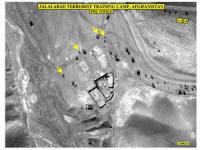-
IS’s English-speaking fighters use Telegram to reinforce faith in the caliphate
English-speaking Islamic State supporters are refusing to give up on the terror group’s ability to remain a force in Syria and Iraq. Even as the terror group was losing ground in Syria and Iraq to U.S.-backed forces, and even as IS leadership was encouraging followers to start looking to progress in IS provinces elsewhere, English-speaking supporters turned to Telegram to reinforce their faith in the caliphate.
-
-
In Israel, former British PM Blair brands Labour leader Corbyn an anti-Semite

The leader of the British Labour Party, Jeremy Corbyn, is an anti-Semite, former British Prime Minister, Tony Blair, said Monday during a visit to Israel. Blair – who was leader of the Labour Party from 1994 and Prime Minister from 1997 until his resignation in 2007 – slammed the “shameful” anti-Semitism crisis that has engulfed his party, when asked if he believed Corbyn himself was anti-Semitic.
-
-
Eritrea removed from U.S. terror list

The United States last week removed Eritrea from a list of countries uncooperative in the fight against terrorism. Until Wednesday, Eritrea was the only African country on the list, and it found itself alongside such pariah nations as Syria, North Korea and Iran.
-
-
Egypt accused of serious, widespread abuses of civilians in fight against ISIS
Egyptian military and police forces in the Sinai Peninsula are committing serious and widespread abuses against civilians, Human Rights Watch said in a report released Tuesday. Some of these abuses, part of an ongoing campaign against members of the local ISIS affiliate, the Sinai Province group, amount to war crimes.
-
-
Biodefense Manhattan Project
The Blue Ribbon Study Panel on Biodefense will hold a day-long meeting to discuss a national, public-private research and development initiative to defend the United States against biological threats. The discussants will be “representatives from the same sorts of organizations that contributed to the original Manhattan Project,” the Blue Ribbon Panel says.
-
-
Responding to the rise in domestic terrorism: Don’t forget prevention
The April attack on a synagogue in Poway, California, was the latest demonstration of the rise in extremist violence in the United States committed not by “jihadists” inspired by ISIS or other international terrorists, but by white supremacists, neo-Nazis or other right-wing groups. Eric Rosand writes in Lawfare that with the Tree of Life Synagogue attacks still fresh in many Americans’ minds, post-Poway discussions further highlighted how the resources and tools available to prevent right-wing extremist violence or domestic terrorism in the United States are dwarfed by those available to deal with the jihadist-inspired violence that data shows to be a much lesser threat. Rectifying this imbalance requires urgent attention.
-
-
Can John Walker Lindh be deradicalized?

John Walker Lindh, the former jihadi dubbed the “American Taliban,” was released from prison Thursday after completing 17 years of a 20-year sentence for supporting the Afghan insurgent group. Unlike other Western nations, the U.S. has no rehabilitation programs for former jihadists, leaving them largely to their own devices.
-
-
Tweets reveal how ISIS still inspires low-level attacks
By analyzing 26.2 million Twitter comments in the Arabic language, researchers found that despite losing territory, ISIS remains successful at inspiring low-level attacks because of its messaging for a “call for lone jihad.”
-
-
Be afraid of the world, be very afraid
Who’s right: Cassandra or Dr. Pangloss? Are we on the brink of serious trouble, as Cassandra of Greek myth prophesied, or is all for the best “in this best of all possible worlds,” as the fictional Pangloss insisted in Voltaire’s Candide? “I’m generally a fairly upbeat guy, despite my realist proclivities and my recurring frustrations at the embarrassing state of U.S. foreign policy,” Stephen M. Walt writes in Foreign Policy. “But today I’m going to indulge my inner Cassandra and describe the five bad things that worry me today. I hope I’m wrong.”
-
-
Why the Christchurch call to remove online terror content triggers free speech concerns
France and New Zealand spearheaded the adoption on May 15 of the Christchurch Call to Eliminate Terrorist & Violent Extremist Content Online, a voluntary pledge endorsed by 18 countries and many tech companies (including Microsoft, Google, Facebook and Twitter). The United States refused to join, citing tofree speech concerns. The Christchurch Call was named after the city in New Zealand where a horrific terrorist attack killed 51 people and injured 50 at two mosques in March. That massacre was live-streamed on Facebook, spreading quickly on that platform as well as other social media sites and raising concerns about how such content goes viral. Evelyn Aswad writes in Just Security that U.S. isolation amidst close allies with respect to this initiative has led to questions about what were the First Amendment hurdles that prevented the U.S. from joining this pledge, especially given it constitutes a political commitment rather than a legally binding document.
-
-
Analytic superiority, public-private cooperation and the future of U.S. foreign intelligence
After years of focusing on counterterrorism, a mainly kinetic threat, the U.S. intelligence community must now adapt to a long-term cyber struggle with nation-state adversaries. This struggle includes election interference and other socio-political disruption, cyber sabotage, theft of secrets, and competition in emerging technologies such as quantum computing and 5G wireless communications. David Kris writes in Lawfare that to succeed against these threats, the intelligence community must shift its approach in two related ways. First, it must focus on analytic superiority as well as cryptographic superiority—terms that I explain below but that basically require a shift in emphasis from accessing data to managing and using data. Second, to achieve analytic superiority, the intelligence community must develop stronger partnerships with the private sector and academia, and a broader base of external support with the American people.
-
-
Whistleblower: Facebook deceived public on extent of extremist content removal
According to a whistleblower’s complaint to the Securities and Exchange Commission (SEC) that was recently revealed in an AP investigation, Facebook has been misleading the public and its shareholders about the efficacy of its content moderation efforts.
-
-
New research on immigration, terrorism, and ideology
In the 43 years between 1975 and 2017, terrorists — foreign-born, native-born, and unknown – killed 3,518 Americans on U.S. soil (this includes the 9/11 attacks). During the same period, about 800,000 Americans were killed in homicides. Overall, the chance of being murdered by a foreign-born terrorist between 1975 and 2017 was about 1 in 3.8 million per year. The author of a new report says that the main lesson from the report is that there are very few terrorists of any ideology or origin who pose a threat to Americans on U.S. soil, and even fewer who manage to murder Americans. “The ideology, frequency, deadliness, and origins of terrorists are fascinating,” the author says, but these numbers are so small that it is difficult “to be overwhelmed by fear.”
-
-
The author of “World War Z” is worried about germ warfare
What if Zika had been cooked up in a lab? Max Brooks, the author of World War Z, writes in Slate that in 2016, he asked that question in an op-ed for the New York Daily News. At the time, Zika was spreading across the country, and Congress seemed to be treating it like the common cold. But what about the next time? What if the next attack comes not from bacteria like anthrax but from a virus like the 1918 influenza? What if someone digs up a frozen, infected corpse or, like Amerithrax, smuggles the disease out of a lab? If we were caught by surprise by a natural outbreak like Zika—which is waning now but was devastating for those affected—how could we even hope to survive an artificial plague?
-
-
Developed countries see economic benefits from combatting terrorism

A new study suggests that developed counties may see significant economic gains from their efforts to combat terrorist threats. Developing counties, in contrast, appear to suffer economically from counterterrorism threats.
-
More headlines
The long view
How Male Grievance Fuels Radicalization and Extremist Violence
Social extremism is evolving in reach and form. While traditional racial supremacy ideologies remain, contemporary movements are now often fueled by something more personal and emotionally resonant: male grievance.
